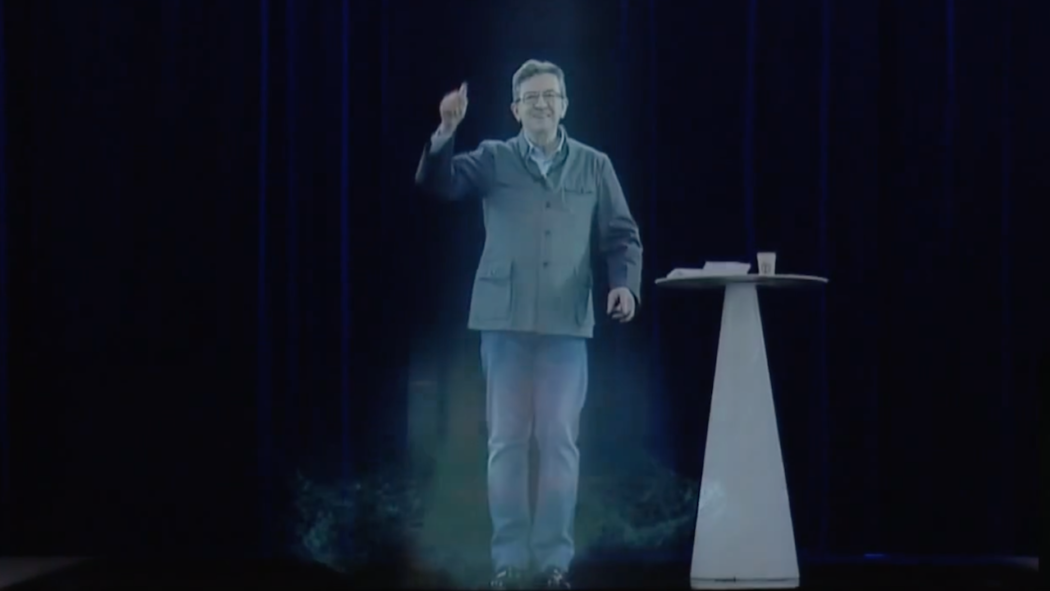Jean-Luc Melenchon Uses Digital Media to Become Most Discussed Candidate
Holograms, YouTube videos, Twitter, Facebook and even a video game, have made French presidential candidate Jean-Luc Melenchon the most watched and talked about candidate online prior to the election. Although coming fourth in the polls at the recent French election, Melenchon has proved the power of gaining popularity remains with the utilization of social networks and digital media.
A follower of YouTube, Twitter, and Facebook, Melenchon made a breakthrough during the weeks before the first round of polls, becoming the most watched and discussed politician on social networks. His hologram stunt, whereby he gave a speech simultaneously in two venues, miles away from each other, has become a historical feat of PR. Perhaps, his biggest feat, however has been the massive influx of people watching him on social media.
Social media data collection agency, MakeMeStats found 7.33 million talked about Melenchon on Facebook in March, leading up to the election. His initial speech, also published on Facebook generated 1.5 million views, while a second, in which he speaks in front of a room of his supporters, reached 2.9 million views. In comparison, far-right candidate Marine Le Pen was talked about 6.5 million times. As for the new President of France, 3.17 million discussed Emmanuel Macron, 3.7 million discussed Francois Fillon, and 1.7 million for Benoit Hamon, over the same period.
Tapping into Online Video
Although these statistics do not represent the electoral intentions of the French, they do show the power of online video with the French people, especially Millennials (18 – 35 years). In France every second internet user, between the ages of 16 and 44, visits YouTube every day. Two thirds of them view content several times a day. By using online video, Melenchon has no time constraints on his speeches, he can interact with his audience, via social media, and it allows him to by-pass media regulations, which may be prejudiced. With over 307,000 subscribers to his YouTube channel, Melenchon and his communication team, led by Sophia Chikirou, have made several popular programs and speeches leading up to the election.
‘Journals of the Week,’ was one popular program where Melenchon, seated at home on the sofa, reviewed the highlights of the week and gave his analysis of them. Another program, ‘Esprit de Campagne’ was created as a more conventional political broadcast, but like ‘Journals of the Week,’ was only transmitted on YouTube. As there were no time constraints, the program oscillated between 2am and 5.30am and allowed Melenchon to field live questions from viewers on social media and enabled him consistent exposure to defend his political positions.
Taking Politics into Gaming
Another way in which Melenchon has dived into unknown political and digital territory, is by releasing a video game, Fiscal Kombat. According to the New York Times, the idea stemmed from Melenchon’s grass roots supporters who created an online community to debate and push his program. ‘Le Discord Insoumise,’ a play on his slogan ‘La France Insoumise’ and the title of gaming software created a 2D, side-scrolling, video game, reminiscent of 90’s arcade games. Fiscal Kombat is also a play on the popular fighting game Mortal Kombat. The game stars an angry looking Melenchon walking along a street and shaking the money out of his political competitor’s pockets. Each candidate starts with a conversation with Melenchon, where he expounds his policies, such as, taking France out of NATO, renegotiating treaties with the EU and eliminating nuclear power. Using a video game to get across his ideas, Melenchon is clearly relating to a young and modern audience and taking digital media platforms in a new direction.
Social Media Influence
Although these online social and digital media platforms have not replaced mainstream French media, they have managed to reach and target audiences that were either unpolitical or uninterested before. According to Guilhem Fouetillou, a founder of Linkfluence, a software company that monitors, analyses and activates social media users, this type of social media interaction enables people to create an audience where there was none, and the politicians are realizing this. Fouetillou said that at least two of the five candidates bought his Linkfluence software. With 927,000 Facebook followers, Melenchon falls behind some of the other candidates as Le Pen has some 1.3 million followers.
Linking electoral results to social media popularity, however, does not work. Although Melenchon had a huge influx of followers and viewers on Facebook and YouTube, he still lost the election to Emmanuel Macron. His campaign, however has set a new precedent.
















There are no comments
Add yours